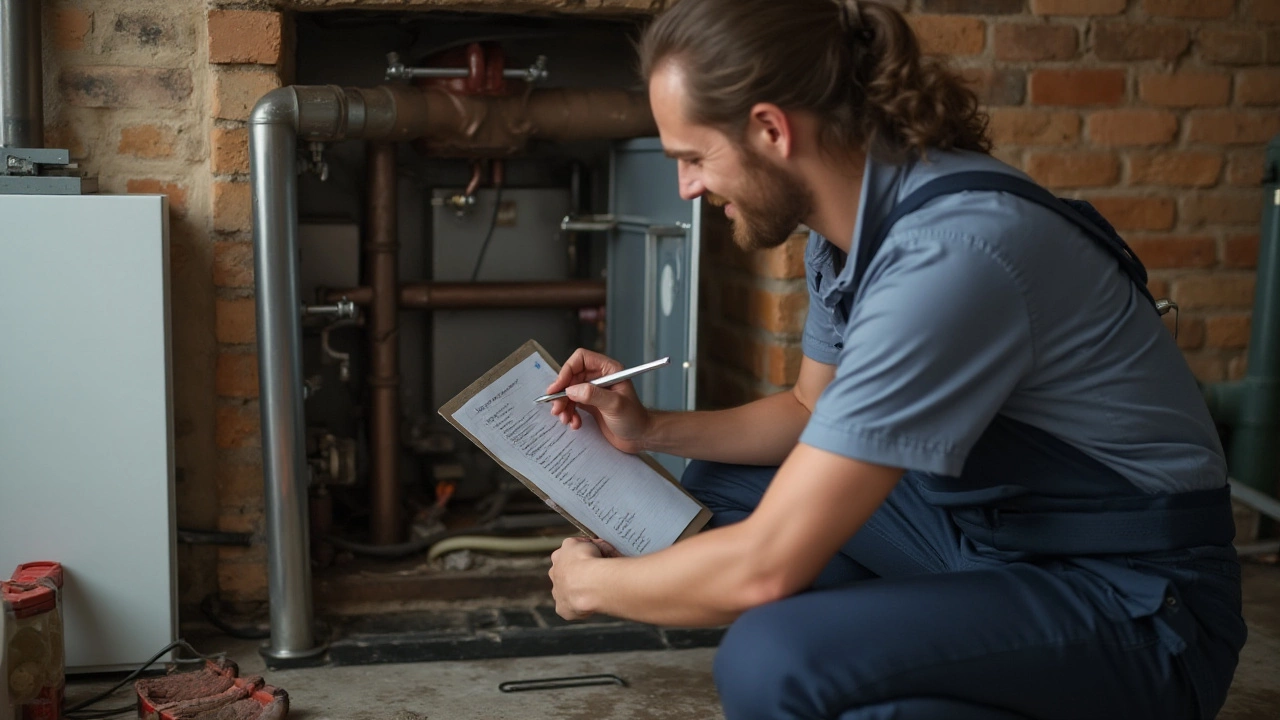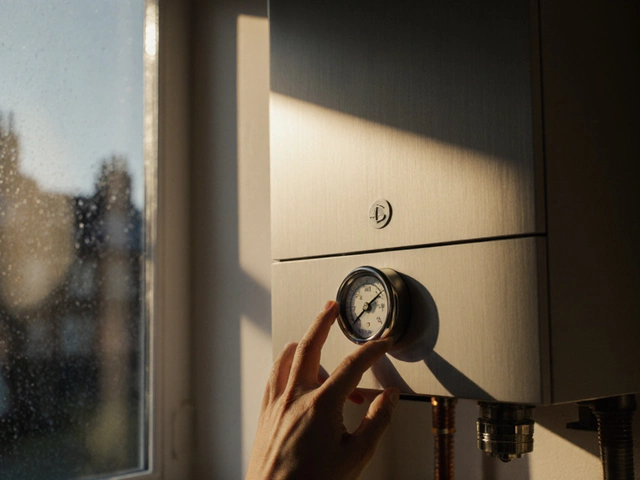The heart of your home’s heating system, the boiler, plays a crucial role during the chilly months. Yet, as with any appliance, it's important to recognize it has a finite lifespan. While many of us might dream of never having to replace this vital component, reality dictates otherwise.
How long can your boiler realistically last? This is a question that homeowners frequently ponder, especially when the winter frost begins to settle. Typically, a well-looked-after boiler could last anywhere from 10 to 15 years. But don't let this average mislead you; things like the frequency of maintenance, the model, and the quality of installation can greatly influence this number.
Your boiler's efficiency and performance hinge on many factors, and understanding these can help you maximize its lifespan. Regular servicing by a trusted professional, timely repairs, and recognizing early warning signs are key in ensuring your boiler heats your home as expected year after year.
- Boiler Lifespan: What to Expect
- Factors Affecting Boiler Durability
- The Importance of Regular Maintenance
- Signs It's Time for a New Boiler
Boiler Lifespan: What to Expect
When considering the lifespan of a boiler, it's crucial to understand that several factors come into play. A typical boiler will last between 10 to 15 years, depending on how well it is maintained and the quality of its manufacturing. If you've ever lived in a place with harsh winters, you know the importance of a reliable heating system. Boilers, especially the modern ones, are built to be robust, but time and use will inevitably take their toll.
Let's set the expectations straight: regular maintenance is key to hitting that upper limit in lifespan. Just as a car benefits from routine servicing, so too does your boiler. If overlooked, minor issues can snowball into major headaches. Annual inspections by certified professionals can spot potential problems early, ensuring your boiler’s maintenance stays on track, helping you avoid the dread of unwelcome breakdowns right in the middle of a cold snap.
The lifespan also hinges on the type of boiler you have. Combi boilers, heat-only, and system boilers each offer different advantages and potential longevity. Combi boilers are popular for their efficiency and compact size, but they may not last as long as a heat-only boiler which is often more durable over decades. It's worth doing some research or consulting an expert when choosing a replacement to weigh these pros and cons based on your usage.
The environment in which your boiler operates can also affect its lifespan. Hard water areas can be particularly challenging because mineral buildup can clog pipes, reducing efficiency and potentially leading to a shorter life. In such cases, a water softener might be a good investment. Environmentally, poor ventilation or damp surroundings might also contribute to a boiler’s untimely demise.
New technological advances have enhanced boiler designs dramatically, improving efficiency and safety features. According to a white paper by a renowned heating technology institute, "Today's boilers are 90% more fuel-efficient than those installed a decade ago."
"A well-serviced, modern boiler can outlast older counterparts under the same conditions," says Energywise UK.Choosing a boiler with a good energy rating can also help sideline replacement costs and keep your utility bills in check.
While lifespan is a matter of statistics and probability, it's clear the best way to stretch your boiler's life is through careful consideration during purchase and dedication to maintenance. Scheduling regular check-ups, adhering to manufacturer guidelines, and promptly addressing any odd noises or leaks are prudent practices. Not only does this enhance longevity, but also ensures you’re not left clutching a broken thermostat when you least expect it. Taking proactive measures won’t just save you money; it’ll keep you cozy when winter’s chill descends.

Factors Affecting Boiler Durability
When it comes to the longevity of a boiler, several critical factors play a determining role in its boiler lifespan. Understanding these factors can help homeowners not only anticipate potential issues but also extend the efficient operational life of their heating system. One of the most notable factors is the quality of installation. A poorly installed boiler, no matter how advanced or expensive, will struggle to perform optimally and may suffer from early wear and tear. It's crucial that the boiler is fitted correctly, with all the necessary components aligned to work seamlessly together. Engaging a certified professional for installation can save you future headaches and costs.
Another vital aspect that impacts boiler maintenance and durability is the water quality within the system. Hard water, often found in certain areas, contains a high mineral content which can lead to limescale buildup within the boiler. This limescale acts as insulation around the heating elements, making it more challenging for the boiler to heat water efficiently, leading to increased energy consumption and eventual component failure. Regularly checking and treating water for hardness can prevent such damage. Installing a water softener might be a worthy investment in areas prone to hard water issues.
Regular maintenance is also crucial to ensuring a boiler's durability. A diligently serviced boiler is akin to a well-oiled machine, operating smoothly and efficiently. Annual servicing by a professional not only checks for imminent problems but also ensures all parts are clean and fit for purpose. During these servicing sessions, a technician might adjust controls for optimum energy efficiency or replace worn-out parts before they cause significant issues. As boiler specialist Alex Minard famously stated,
'Routine check-ups for your boiler are as essential as an annual health check-up for your body. Neglect either, and you might pay the price later.'
The choice of the boiler type itself has a profound impact on its life. Modern units, especially those which are condensing, offer extended lifespans owing to their advanced technologies and materials. These boilers have larger heat exchangers and are designed to capture more heat, which greatly improves efficiency. However, they also require more careful maintenance, as neglecting it can negate the advantages they hold over traditional systems. The compatibility of the boiler with existing heating systems can also affect its durability, as mismatch can strain the unit, leading to premature damage.
A less obvious yet critical factor is the installation environment of the boiler. Is the boiler stored in a well-ventilated room, or is it stuck in a damp, overcrowded corner? Poor environmental conditions can greatly strain and even damage internal components. Ensure the area around your boiler is spacious enough for air to circulate, reducing the risk of overheating and encouraging efficient operation. Certain models might also require special considerations regarding positioning to work effectively. Additionally, smart usage of the heating system, setting thermostats wisely, and using timers can also help in evenly distributing the load and avoiding unnecessary stress on the boiler.

The Importance of Regular Maintenance
Ensuring that your boiler runs efficiently and reliably throughout its life is not just a matter of luck but requires ongoing and diligent boiler maintenance. Much like a car that needs periodic check-ups and oil changes, your boiler needs consistent care to function at its best. With regular services, your boiler will not only deliver better performance but also have a longer lifespan, effectively serving your home for possibly up to two decades. The essence of routine maintenance lies in the fact that it helps catch potential issues before they turn into costly repairs or replacements, saving you significant time and money in the long run.
During a maintenance check, a professional technician will conduct thorough inspections, which include everything from checking the pressure and pilot light to examining the integrity of pipe connections and ensuring that all safety controls are in place. Among the numerous benefits, identifying carbon monoxide leaks is a crucial aspect, given that this colorless, odorless gas can be deadly. Regular inspection ensures that your boiler's emissions remain within safe limits, providing peace of mind alongside warm comfort during the frosty months.
Boiler repair professionals often stress that maintaining a clean system is imperative for efficiency. Over time, sludge and debris can accumulate, obstructing pathways and making the boiler work harder than necessary. This not only increases energy consumption but also accelerates wear and tear on the system. Flushing the system regularly is advisable to prevent these unwanted buildups. Furthermore, keeping an eye on the pressure gauge and adjusting it when necessary can also help maintain optimal boiler performance.
It's important to understand that boiler lifespan is closely linked to how well you care for it. Ignoring regular checks might shave years off its structurally sound life. The once-a-year servicing not only meets most manufacturers' warranty conditions but also acts as a proactive measure, addressing minor glitches before they morph into major headaches.
As a report from the Energy Saving Trust indicates, "An efficiently running boiler may save you as much as £300 per year in heating bills."Figures like these underscore why investing in routine check-ups is beneficial not just for extending your boiler's life but also for ensuring your wallet isn't unnecessarily strained.
Another worthwhile practice during maintenance is updating components where necessary. Valves, thermostats, and fans that exhibit signs of aging can be replaced to enhance functionality and energy efficiency. Staying ahead of potential failures by modernizing older parts contributes significantly to the steadiness of your system. Boasting added benefits, improved parts can reduce heating times and provide better control over temperature settings, which ultimately boosts comfort across household members.
Here's a quick snapshot of potential maintenance checks often overlooked by homeowners but found essential by industry experts:
- System Pressure Checks: Ensures the boiler operates within safe parameters to prevent internal damage.
- Ventilation Pathway Analysis: Guarantee unobstructed airflow for efficient and safe boiler function.
- Water Quality Assessment: Identifying mineral deposits that could impair efficiency.
- Examination of Heat Exchangers: Checking for signs of corrosion or leaks.
A proactive approach to maintenance translates into fewer surprises and a longer, trouble-free life for your trusty home boiler. Most importantly, it highlights the indispensable role regular maintenance plays not just in economic savings but in safeguarding families from unseen hazards associated with neglected systems.

Signs It's Time for a New Boiler
Your trusty boiler has seen you through many winters, quietly humming in the background as it warmed your home. But like all good things, even the most reliable boilers meet their end. Knowing when to replace your boiler rather than patch it up can save you not only money but also the panic of a mid-winter breakdown.
One of the most telling signs is the age of the boiler itself. If your boiler is ticking over the 15-year mark, it may be time to start considering a replacement. Boilers typically last between 10 to 15 years. As they age, they often become less efficient, leading to increased energy bills. This is sometimes due to outdated technology that can't compete with the efficiency of newer models. It's worth noting that Energy Saving Trust research shows that old boilers can run at less than 70% efficiency compared to 85% or more for a new, high-efficient boiler.
Another red flag to watch for is the frequency and cost of repairs. If it seems like your boiler technician is on your speed dial, it might be a tell-tale sign. Regular breakdowns and escalating repair bills can quickly outweigh the cost of investing in a new system. Boiler maintenance is crucial, but when repairs are continuously needed, it generally signals that something isn't right with your system. If you find yourself paying more each year to keep it running smoothly, then it's likely time to look at more cost-effective options.
"A persistent decline in performance despite regular maintenance could indicate irreparable damage, making replacement the most viable option," says Simon Brandon, a well-regarded boiler expert from the UK.
Increased noise levels can also indicate that your boiler is nearing the end of its life. If your boiler is sounding more like a clattering factory than a heating appliance, parts may be on the verge of failing or have already worn out. Modern boilers are designed to run quietly, so persistent noises—such as banging, whirring, or clunking—should not be ignored. It could be a safety risk, and such noises deserve an immediate call to a professional.
Next, keep an eye out on how long it takes for your home to heat up. If you’re noticing the heat isn't consistent throughout, or your home takes much longer than usual to get warm, it might mean your boiler is struggling to perform. This is particularly evident during cold snaps when boilers need to work the hardest. Boiler replacement might bring back that comforting warmth without the wait.
Finally, if you notice a marked rise in your utility bills with no other explanation, it may be that your boiler is no longer operating efficiently. Newly designed boilers are engineered with energy efficiency in mind, with many now featuring smart technologies that adjust the heating flow according to the demand. These features not only save energy but also cut down the costs.




